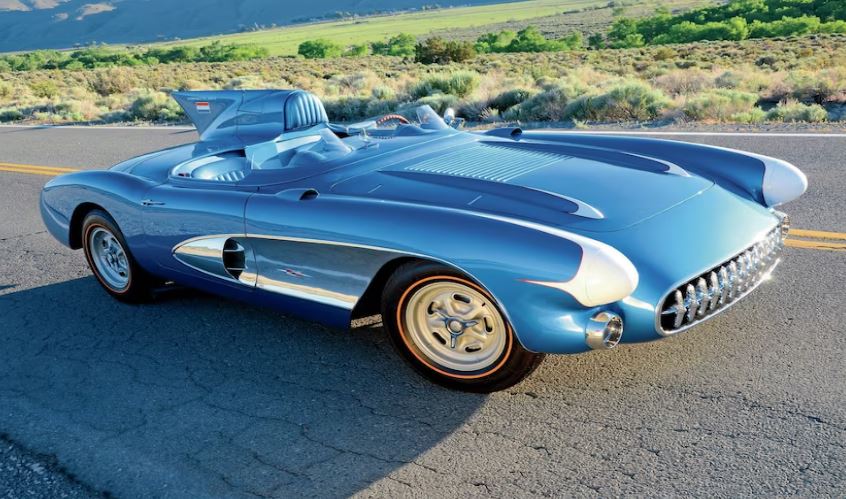
In the storied history of American sports cars, few names evoke the same level of passion and nostalgia as the Chevrolet Corvette. The iconic “Vette” has been a symbol of American performance and style since its inception in 1953. While the original Corvette captured the hearts of car enthusiasts with its sleek design, it was the introduction of special models like the 1956 Chevrolet Corvette SR-2 that solidified the Corvette’s reputation as a serious contender in the world of sports car racing.
Origins and Significance

The Chevrolet Corvette SR-2, short for “Sebring Racer 2,” was a limited-production model developed by General Motors to bolster the Corvette’s presence and performance in sports car racing, particularly at the iconic 12 Hours of Sebring race in Florida. The development of the SR-2 was in response to the increasing competition in the world of motorsports, particularly from European manufacturers like Ferrari and Jaguar.
At the time, Chevrolet was determined to prove that the Corvette was not just a stylish cruiser but a high-performance sports car capable of taking on the best from around the world. The SR-2 was born out of this desire to compete and solidify the Corvette’s reputation in the racing circuit. In doing so, it laid the foundation for the Corvette’s long and successful journey in the world of motorsports.
Design and Styling

The 1956 Chevrolet Corvette SR-2 retained the classic and iconic Corvette styling, characterized by its long, sculpted body, prominent front grille, and iconic twin-cove side panels. However, several key design elements set the SR-2 apart from the standard Corvette models of the era.
The SR-2 was often adorned with a distinct paint scheme. The most common combination was Arctic Blue with a white racing stripe running down the center of the car, emphasizing its racing pedigree.
One of the most distinguishing features of the SR-2 was the streamlined fin that extended from the rear of the car. This fin was not only a stylistic element but also served to improve aerodynamics and stability at high speeds.
The SR-2 featured additional chrome accents and louvers on the front fenders, adding to its aggressive and sporty appearance.

In keeping with its racing intentions, the SR-2 had numerous race-ready features, including a full roll cage, lightweight racing seats, competition-grade suspension, and wide racing tires.
Under the Hood
The true magic of the 1956 Chevrolet Corvette SR-2 lay under the hood. The SR-2 was powered by a modified version of Chevrolet’s famed small-block V8 engine, specifically the 265-cubic-inch V8. This powerplant was paired with a close-ratio three-speed manual transmission, creating an impressive combination for its era.
The SR-2’s V8 engine featured high-compression heads and a solid-lifter camshaft. This performance-oriented setup allowed the engine to produce around 240 horsepower, a significant improvement over the standard Corvette of the time. This enhanced power output, combined with the car’s lightweight design, gave the SR-2 a competitive edge on the race track.

The competition-ready suspension, racing brakes, and limited-slip differential contributed to the car’s ability to handle the rigors of high-speed racing. The SR-2’s mechanical configuration was a testament to Chevrolet’s commitment to creating a world-class racing machine.
Racing Pedigree
The primary purpose of the 1956 Chevrolet Corvette SR-2 was to excel on the racetrack. As such, it was primarily aimed at professional racing teams and private racers who sought to compete in various endurance and sports car racing events. The car’s most notable appearances were at the 12 Hours of Sebring, one of the most prestigious sports car races in the United States.
At the 1956 Sebring race, the SR-2 made a significant impact. It was driven by John Fitch, an accomplished racing driver and engineer. The SR-2’s performance at Sebring was impressive, and Fitch and his co-driver, Walt Hansgen, secured a respectable ninth-place finish overall. This achievement firmly established the SR-2’s credibility as a serious contender in the world of sports car racing.
The Legacy of the 1956 Chevrolet Corvette SR-2

While the 1956 Chevrolet Corvette SR-2 had a relatively short production run, its impact on the Chevrolet Corvette’s legacy and the world of motorsports cannot be overstated. Here are some of the key aspects of its lasting legacy:
Advancements in Racing Technology: The SR-2 was a platform for testing and introducing new racing technology that would later find its way into Chevrolet’s high-performance models. The development and fine-tuning of the SR-2’s engine and chassis components directly contributed to Chevrolet’s success in motorsports.

The SR-2’s design elements, such as the integrated fin and distinctive paint scheme, have become iconic and are often referenced in modern Corvette models and custom builds. These elements continue to inspire car enthusiasts and designers alike.
The SR-2’s strong showing at the 1956 Sebring race demonstrated that American sports cars, specifically the Corvette, could compete with European rivals on the international stage. This achievement marked a turning point in American motorsports.

The success of the SR-2 at Sebring paved the way for the Corvette’s enduring legacy in motorsports. Subsequent Corvette models, including the Grand Sport and Z06, became dominant forces on the race track, showcasing the brand’s racing pedigree.
Today, the 1956 Chevrolet Corvette SR-2 is a highly sought-after collector’s item. Its limited production and historical significance make it a prized possession for car enthusiasts and collectors. Well-preserved examples can fetch significant sums at auctions.
Conclusion

The 1956 Chevrolet Corvette SR-2, with its distinctive design and formidable performance, stands as a testament to Chevrolet’s commitment to racing excellence. While the SR-2 had a relatively brief moment in the spotlight, its impact on the Chevrolet Corvette’s legacy and the world of motorsports is enduring. It played a crucial role in proving that American sports cars could compete with the best in the world, setting the stage for the Corvette’s future successes on and off the race track. The SR-2 is a beloved piece of automotive history, and its legacy continues to be celebrated by car enthusiasts who appreciate its unique blend of style and racing prowess.





